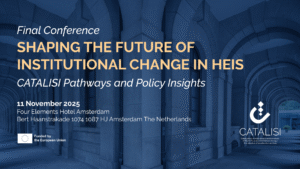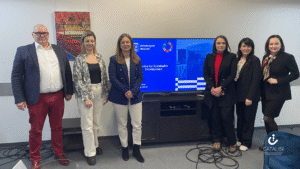
The Thess-AHALL Example: Revolutionizing the Regional Health and Wellbeing ecosystem through Living Labs Integration.
For over a decade, the Thessaloniki Action for Health and Wellbeing Living Lab (Thess-AHALL) has championed research and innovation, enhancing health and wellbeing in Thessaloniki and beyond. Initially established in 2014 with a focus on Active & Healthy Aging, Thess-AHALL has since expanded its mission to embrace a holistic approach to health and well-being. This broader initiative promotes cross-sectoral collaboration, involving stakeholders from various fields to develop solutions that improve the quality of life.
Thess-AHALL integrates diverse sectors, including oncology, agri-food, urban resilience, environmental change, mass communication, and culture. This comprehensive model transforms Thessaloniki into a living lab that addresses complex health challenges holistically. By uniting city authorities, museums, libraries, and university research groups, Thess-AHALL fosters initiatives that enhance the quality of life and promote independent living. Thess-AHALL employs participatory design and city science methodologies to co-create solutions with the community.
Οne of the key activities that Thess-AHALL undertook was the Collaboration & Research Community for Independent Living. This citizen-led research group comprised older adults, patients, caregivers, and healthcare professionals. The dynamic panel actively engaged in living lab activities, applying scientific research methodologies in an experiential learning manner. They shared experiences, codesigned solutions, and participated in educational field visits. Recognizing their pivotal role, ThessAHALL developed a model to elevate their status from collaborators to co-owners, advancing towards a new patient-led living lab model.
Another significant initiative was the PECan project, or Partners of Experience in Cancer. This project cultivated a culture of mutual understanding and collaboration between cancer patients and the research community. It involved caregivers, healthcare professionals, and medical students, aiming to establish the first Living Lab self-governed by citizens, fostering research, open science, and innovation in oncology.
As part of this initiative, we established the Collaboration & Research Community for Independent Living. This citizen-led research group comprises older adults, patients, caregivers, and healthcare professionals. The dynamic panel actively engaged in living lab activities, applying scientific research methodologies in an experiential learning manner. They share experiences, co-design solutions, and participate in educational field visits. Recognizing their pivotal role, Thess-AHALL is developing a model to elevate their status from collaborators to co-owners, advancing towards a new patient-led living lab model.

Figure 1: Collaboration & Research Community for the Independent Living “Partners of Experience”
Furthermore, the CAPTAIN H2020 program designed a smart home assistant for older adults using micro projectors. Thess-AHALL led the co-creation and experimentation framework for this project, resulting in the development of the “Partners of Experience” methodology. This methodology was later utilized in other European projects like HOSMARTAI H2020 and iProlepsis Horizon Europe.
Another noteworthy initiative is the VITALISE H2020 project, which harmonized access to Health and Wellbeing Living Labs for researchers, promoting cross-disciplinary and cross-border experimentation. Thess-AHALL performed three Living Lab projects and facilitated six research studies from external researchers. A significant outcome of this project was the development of a web-based panel management tool (app.thepanelab.com) for use by external Living Labs. By providing a centralized platform for managing participant panels, the tool streamlined the recruitment, tracking, and engagement of study participants, making it easier for researchers to conduct high-quality, large-scale studies. Furthermore, by offering a shared resource that can be used across various departments and research groups, it facilitates the integration of diverse fields such as healthcare, technology, social sciences, and more. This promotes a more holistic approach to research and innovation, encouraging the blending of different perspectives and expertise to address complex health and wellbeing challenges.
Thess-AHALL actively engaged in three Living Lab projects and provided support for six research studies conducted by external researchers. These initiatives focused on testing and evaluating new technologies within the healthcare sector, contributing to the advancement of innovative solutions and interdisciplinary collaboration.

Figure 2 – Stakeholders creating and enhancing learning tools in Thess-AHALL’s premises
The true strength of Thess-AHALL lies in its extensive network of collaborators within the Quadruple Helix, spanning local, national, and EU levels. The integration of Thess-AHALL within the Aristotle University of Thessaloniki illustrate how universities can serve as catalysts for innovation and regional development. The living lab model facilitates dynamic interaction between academic research, technological development, and real-world application, creating fertile ground for breakthroughs in health and wellbeing. By embedding living labs within the university structure, ThessAHALL harnesses academic expertise, fosters interdisciplinary collaboration, and bridges the gap between theory and practice. The involvement of the Quadruple Helix is crucial, as it ensures that innovation is driven by a holistic approach, incorporating perspectives from academia, industry, government, and civil society to create more impactful and sustainable solutions.
Through its national and international synergies, involvement in numerous research projects, and deep knowledge of working with diverse populations, Thess-AHALL drove meaningful social change in the local ecosystem.

Figure 3: Thess-AHALL Co-Designing, LL activities and Educational Visit



